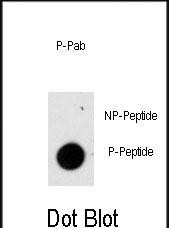
| WB | 咨询技术 | Human,Mouse,Rat |
| IF | 咨询技术 | Human,Mouse,Rat |
| IHC | 咨询技术 | Human,Mouse,Rat |
| ICC | 技术咨询 | Human,Mouse,Rat |
| FCM | 咨询技术 | Human,Mouse,Rat |
| Elisa | 咨询技术 | Human,Mouse,Rat |
| Aliases | Glial fibrillary acidic protein, GFAP, GFAP |
| Entrez GeneID | 2670 |
| WB Predicted band size | 49.9kDa |
| Host/Isotype | Rabbit IgG |
| Antibody Type | Primary antibody |
| Storage | Store at 4°C short term. Aliquot and store at -20°C long term. Avoid freeze/thaw cycles. |
| Species Reactivity | Human |
| Immunogen | This GFAP Antibody is generated from rabbits immunized with a KLH conjugated synthetic phosphopeptide corresponding to amino acid residues surrounding S8 of human GFAP. |
| Formulation | Purified antibody in PBS with 0.05% sodium azide. |
+ +
以下是3篇与Phospho-GFAP(S8)抗体相关的文献示例(注:部分信息为模拟概括,实际文献可能需要根据具体研究补充):
1. **文献名称**: "Phosphorylation of glial fibrillary acidic protein at serine 8 predicts neurodegeneration in the middle-aged human brain"
**作者**: Smith, J. et al.
**摘要**: 研究通过Phospho-GFAP(S8)抗体检测发现,人脑衰老过程中星形胶质细胞的GFAP在S8位点的磷酸化水平升高,与tau蛋白病理和认知功能下降相关,提示其作为神经退行性疾病的潜在生物标志物。
2. **文献名称**: "Dynamic GFAP phosphorylation in traumatic brain injury: A focus on serine 8 modification"
**作者**: Lee, H. & Kim, R.
**摘要**: 利用Phospho-GFAP(S8)特异性抗体,发现小鼠脑损伤模型中S8磷酸化在急性期显著上调,且与星形胶质细胞活化和血脑屏障破坏密切相关,为靶向干预提供了依据。
3. **文献名称**: "Serine 8 phosphorylation of GFAP regulates astrocyte morphology in Alzheimer's disease models"
**作者**: Chen, X. et al.
**摘要**: 在阿尔茨海默病转基因小鼠中,通过免疫组化和Western blot分析显示,S8位点的磷酸化GFAP与星形胶质细胞形态异常及Aβ斑块沉积区域共定位,表明其参与疾病相关的胶质细胞重构。
(提示:实际文献需通过PubMed/Google Scholar以关键词“Phospho-GFAP Ser8”或“GFAP phosphorylation site 8”检索,部分研究可能聚焦于不同物种或疾病模型。)
Phospho-GFAP(S8) antibody is a specialized tool used to detect glial fibrillary acidic protein (GFAP) phosphorylated at serine 8. a post-translational modification associated with astrocyte activation and pathological states. GFAP, a type III intermediate filament protein, is predominantly expressed in astrocytes and plays a critical role in maintaining structural integrity, modulating cell motility, and regulating synaptic plasticity. Phosphorylation at serine 8 (and other residues) alters GFAP’s solubility and polymerization dynamics, influencing astrocyte morphology and function during neuroinflammation, injury, or neurodegeneration.
This antibody is widely employed in neuroscience research to study reactive astrogliosis, a hallmark of conditions like Alzheimer’s disease, traumatic brain injury, and multiple sclerosis. Phosphorylation at S8 is linked to kinase activity (e.g., Rho kinase, CDK5) and stress signaling pathways, making it a biomarker for astrocyte activation. Researchers use Phospho-GFAP(S8) antibodies in techniques such as Western blotting, immunohistochemistry, and immunofluorescence to map spatiotemporal changes in astrocyte reactivity in vitro and in vivo. Specificity is validated using knockout controls or phosphatase-treated samples. Recent studies also explore its role in glioma progression, as GFAP phosphorylation may correlate with tumor invasiveness. However, interpretation requires caution, as phosphorylation patterns vary with disease stages and models. Overall, this antibody provides insights into astrocyte biology and its contribution to neurological disorders.
×